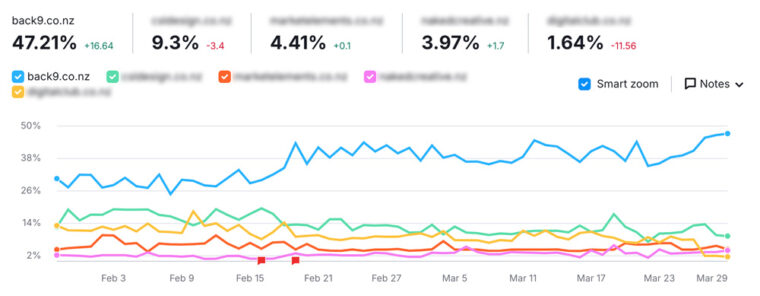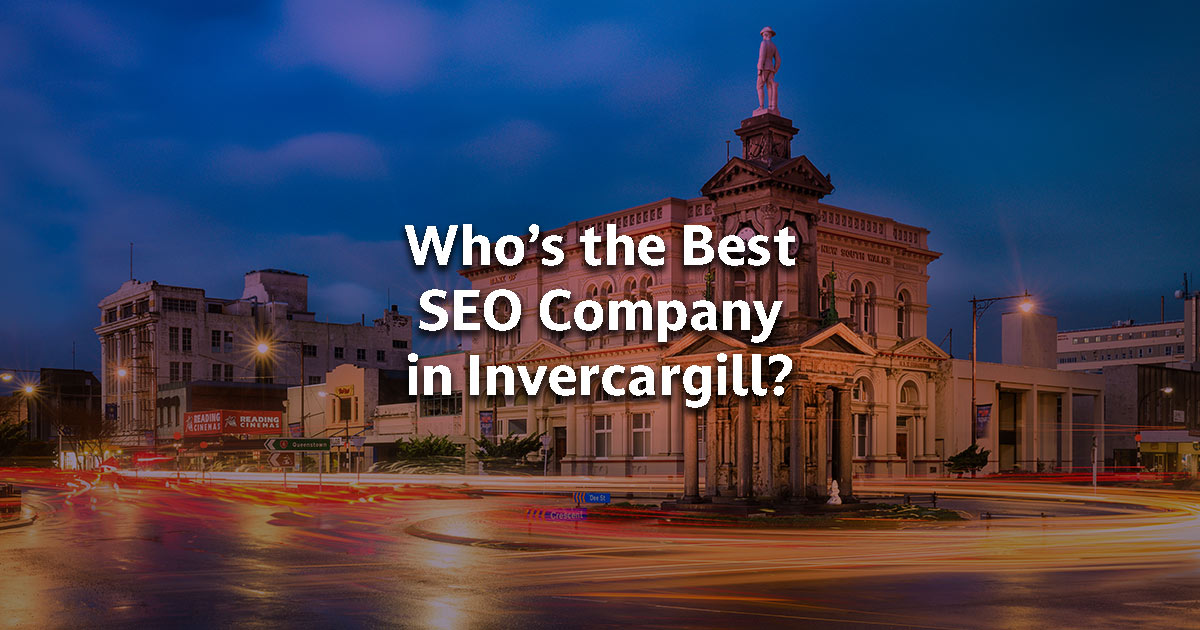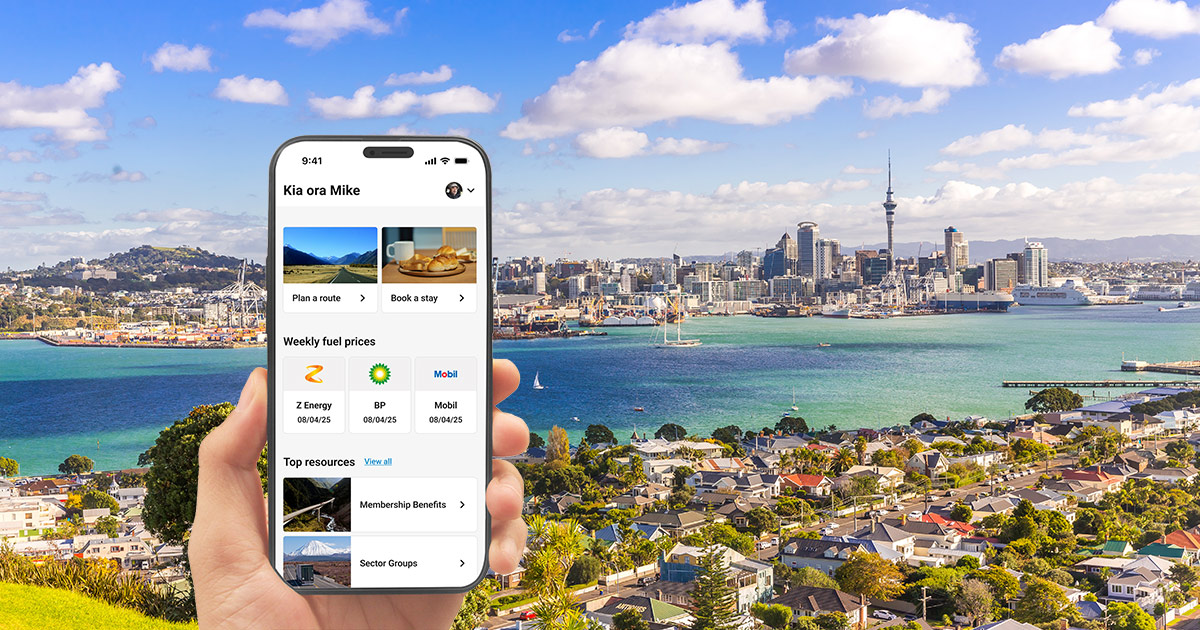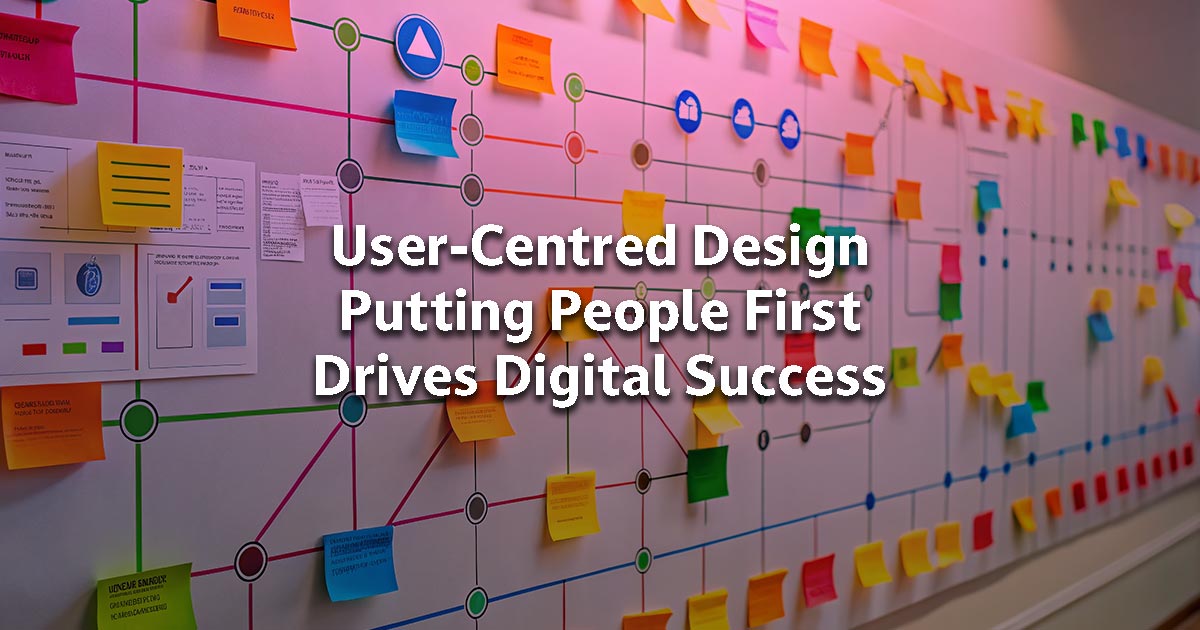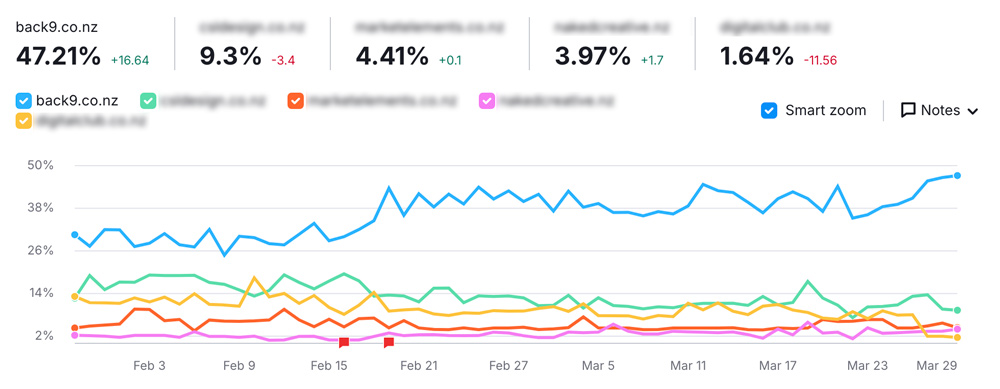At Back9 we often tell people, successful website redesign is not just about aesthetics; it’s about aligning your website with your strategic goals and ensuring it meets the needs of your users. In this article, we’ll explore the essential principles of effective website redesign, helping you transform your site into a powerful tool for business growth.
Below we’ll address the following 3 things (and maybe more):
- How to identify the need for a redesign to begin with
- The importance of (in this day and age) embracing a growth-driven design approach
- How to prioritise user experience.
Additionally, we’ll look into the significance of crafting quality content and leveraging data analytics to guide your redesign efforts.
Understanding the Need for Website Redesign
Before deciding on a redesign journey, it’s crucial to understand why a redesign is necessary.
- Is your website outdated, cluttered, or
- Is it difficult to navigate?
- Are you experiencing high bounce rates or low conversion rates?
Identifying the pain points of your current website will guide your redesign efforts and ensure you address the most pressing issues. By recognising these challenges early on, you can set a clear path for improvement and avoid repeating past mistakes.
A website redesign can also be prompted by changes in your business objectives, target audience, or industry standards. For instance, if you’ve expanded your product line or entered a new market, your website must reflect these changes to remain competitive. Similarly, advancements in technology and shifts in consumer behaviour necessitate regular updates to your online presence. Understanding these drivers will help you make informed decisions during the redesign process.
Assessing Your Current Website
Start by performing a comprehensive audit of your existing website. Evaluate its performance, design, user experience, and content. Tools like Google Analytics can provide valuable insights into user behaviour, while heat maps can reveal how visitors interact with your site. This data will serve as a baseline to measure the success of your redesign efforts. Conducting a thorough assessment will also help you identify specific areas that require improvement, such as page load times, mobile responsiveness, or outdated content.
In addition to quantitative data, gather qualitative feedback from your users. It’s a great idea to conduct surveys or interviews to understand their pain points, preferences, and suggestions for improvement. This user feedback is invaluable in shaping a redesign that truly meets the needs of your audience. Furthermore, benchmarking your website against competitors can provide additional insights into industry trends and best practices.
Setting Clear Objectives
Once you’ve identified the issues with your current site, define clear objectives for your redesign. Are you aiming to improve user experience, increase engagement, or boost sales? Setting specific, measurable goals will help you stay focused and track your progress. Establishing these objectives early in the process ensures that every design decision is aligned with your broader business strategy.
Your objectives should be realistic and aligned with your available resources. Consider the time, budget, and expertise required to achieve your goals. It’s also important to prioritize your objectives based on their potential impact on your business. For example, improving mobile responsiveness might be a top priority if a significant portion of your traffic comes from mobile users.
Embracing Growth-Driven Design
It’s now 2025, and time to accept that Traditional web design is broken! And that’s primarily due to the fact a website will never be perfect. It will never be ‘finished’.
Traditional web design often involves a complete overhaul of the website every few years, which can be time-consuming and costly. Growth-Driven Design (GDD) offers a more agile approach, focusing on continuous improvement based on data and user feedback. This iterative process allows businesses to adapt quickly to changing market conditions and user needs, ensuring that their website remains relevant and effective.
Not only does GDD Maximise success online, it emphasises a strategic, user-centric approach to web design. By continuously analysing user data and feedback, you can make informed decisions about which areas of your website need improvement. This approach not only reduces the risk associated with traditional redesigns but also ensures that your website evolves in line with your business objectives and user expectations.
The Growth-Driven Design Methodology
GDD is a three-phase process: strategy, launch pad, and continuous improvement.
- Strategy:
In this phase, you establish your goals, user personas, and key performance indicators (KPIs). This foundation guides your redesign efforts, ensuring every decision aligns with your strategic objectives. A well-defined strategy provides clarity and direction, helping you prioritize tasks and allocate resources effectively.
- Launch Pad:
Rather than a full redesign, you create a “launch pad” website—a functional, improved version of your site that can be built quickly. This site serves as a starting point for ongoing improvements. The launch pad site allows you to test new ideas and gather user feedback, facilitating a more informed approach to continuous improvement.
- Continuous Improvement:
With your launch pad site live, you enter the continuous improvement phase. Using data and user feedback, you make iterative enhancements to your website, prioritising the changes that have the most significant impact on your goals. This phase emphasises agility and responsiveness, allowing you to adapt to new challenges and opportunities as they arise.
Benefits of Growth-Driven Design
GDD reduces the risks associated with traditional redesigns by focusing on data-driven decisions and ongoing optimisation. This approach allows you to adapt to changing user needs and market trends, ensuring your website remains relevant and effective. Additionally, GDD fosters a culture of continuous learning and improvement within your organisation, empowering your team to stay ahead of the curve.
Another key benefit of GDD is its cost-effectiveness. By avoiding the pitfalls of a complete redesign, you can allocate resources more efficiently and achieve better results over time. This agile approach also enables you to respond quickly to feedback and implement changes that enhance user experience and drive business growth.
Prioritising User Experience
User experience (UX) is at the core of any successful web redesign. A website that is difficult to navigate or slow to load can frustrate users and drive them away. Prioritising UX ensures that your site is intuitive, accessible, and engaging. By focusing on the needs and preferences of your users, you can create a website that not only attracts visitors but also encourages them to stay and explore.
A positive user experience is essential for building trust and credibility with your audience. When users have a seamless and enjoyable interaction with your website, they are more likely to engage with your content, make purchases, and return in the future. Therefore, investing in UX design is a critical component of any successful web redesign strategy.
Designing for Your Audience
Understanding your target audience is essential for creating a user-friendly website. Develop detailed user or buyer personas that represent your ideal customers, and use these personas to guide your design decisions. Consider factors such as age, preferences, and digital habits to ensure your site meets the needs of your users. By tailoring your design to the specific characteristics of your audience, you can create a more personalised and relevant experience.
In addition to demographic information, consider the motivations and goals of your users. What problems are they trying to solve? What information are they seeking? By addressing these questions, you can design a website that provides real value and meets the expectations of your audience. Regularly updating your user personas based on feedback and analytics will help you stay aligned with changing user needs.
Simplifying Navigation
Clear, intuitive navigation is critical for a positive user experience. Use a clean, organised menu structure that allows users to find what they’re looking for with minimal effort. Consider incorporating breadcrumbs and internal links to improve navigation and help users explore your site. A well-designed navigation system not only enhances usability but also encourages users to spend more time on your site.
In addition to traditional navigation elements, explore innovative approaches such as mega menus, sticky headers, and dynamic search features. These elements can enhance the user experience by providing quick access to information and guiding users to relevant content. Testing different navigation options with real users can help you identify the most effective solutions for your audience.
Enhancing Accessibility
An accessible website ensures that all users, including those with disabilities, can navigate and interact with your site. Follow web accessibility guidelines, such as the Web Content Accessibility Guidelines (WCAG), to make your site inclusive and compliant. Accessibility is not only a legal requirement in many regions but also a reflection of your commitment to providing an equitable online experience for all users.
Considering incorporating features such as alt text for images, keyboard navigation, and screen reader compatibility to improve accessibility is not enough anymore… It’s becoming essential. Additionally, ensure that your website’s design is responsive and functions well on a variety of devices and screen sizes. By prioritising accessibility, you can reach a broader audience and demonstrate your commitment to inclusivity.
Website Redesign: Crafting Quality Content
No doubt you’ve heard it before – But here it is again Content is king. And in the context of a website redesign, it’s crucial to create content that resonates with your audience and supports your business goals. High-quality content can drive traffic, improve SEO, and establish your brand as a trusted authority in your industry. Therefore, investing in content creation and optimisation is a critical aspect of any successful web redesign.
Your content strategy should be informed by your business objectives, user personas, and industry trends. By aligning your content with these factors, you can create a cohesive and effective online presence that supports your broader marketing goals. Regularly updating and refreshing your content will also help you stay relevant and maintain user engagement.
Aligning Content with Strategy
Your content should align with your overall strategy and support your objectives. Whether you’re focusing on brand awareness, lead generation, or customer retention, tailor your content to meet these goals. Consider creating a content calendar that outlines your topics, formats, and publication schedule, ensuring that your content efforts are consistent and strategic.
Collaborate with stakeholders across your organisation to ensure that your content aligns with broader business initiatives. By integrating content into your overall marketing strategy, you can create a unified and powerful message that resonates with your audience. Additionally, regularly reviewing and refining your content strategy based on analytics and user feedback will help you stay aligned with changing business goals.
Creating Engaging, Valuable Content
High-quality content should be informative, engaging, and tailored to the needs of your audience. Use a mix of text, images, videos, and infographics to keep users engaged and convey information effectively. Remember, content is not just about promoting your products or services; it’s about providing value to your audience. By offering relevant, helpful, and entertaining content, you can build trust and loyalty with your users.
Consider leveraging storytelling techniques to create compelling narratives that resonate with your audience. By connecting with users on an emotional level, you can foster deeper engagement and inspire action. Additionally, incorporating interactive elements such as quizzes, polls, and user-generated content can enhance the user experience and encourage participation.
Leveraging Data and Analytics
Data-driven decision-making is key to a successful web redesign. By leveraging analytics, you can gain insights into user behaviour, identify areas for improvement, and measure the success of your redesign efforts. This data-driven approach enables you to make informed decisions and optimise your website for better performance and user satisfaction.
Analytics tools provide valuable insights into user interactions, traffic patterns, and conversion metrics. By regularly monitoring and analyzing this data, you can identify trends and opportunities for improvement. Additionally, setting up custom reports and dashboards can help you track your progress and stay aligned with your redesign objectives.
Identify the KPIs that align with your website redesign objectives, such as conversion rates, bounce rates, and average session duration. Use tools like Google Analytics to track these metrics and assess the impact of your redesign. Regularly reviewing your KPIs will help you measure the success of your redesign efforts and identify areas for further optimisation.
In addition to quantitative metrics, consider gathering qualitative data through user surveys and feedback forms. This information can provide valuable insights into user satisfaction and areas for improvement that may not be captured by traditional analytics tools. By combining quantitative and qualitative data, you can gain a comprehensive understanding of your website’s performance and user experience.
Conducting A/B Testing
A/B testing allows you to experiment with different design elements and determine what works best for your audience. Test variations of your website’s layout, content, and calls-to-action to optimize your site for conversions. By systematically testing and iterating on different design options, you can identify the most effective solutions for your audience and achieve your redesign objectives.
A/B testing can be applied to various aspects of your website, including headlines, images, button placements, and color schemes. By continuously experimenting and refining your design, you can enhance user experience and drive better results. Additionally, documenting your testing process and results will help you build a knowledge base that informs future redesign efforts.
Conclusion
A successful web redesign goes beyond aesthetics; it’s about creating a strategic, user-centric website that supports your business goals. By embracing Growth-Driven Design, prioritising user experience, crafting compelling content, and leveraging data, you can transform your website into a powerful tool for growth. This comprehensive approach ensures that your website remains relevant, effective, and aligned with your business objectives.
Remember, a website like a staff member, a 24/7 employee you didn’t know you needed. This means it’s not a static entity—it’s a dynamic platform that should evolve with your business and the needs of your users. By focusing on continuous improvement, you can ensure your website remains effective and relevant in an ever-changing digital landscape. This commitment to ongoing optimisation will help you stay competitive, meet user expectations, and drive long-term success.
